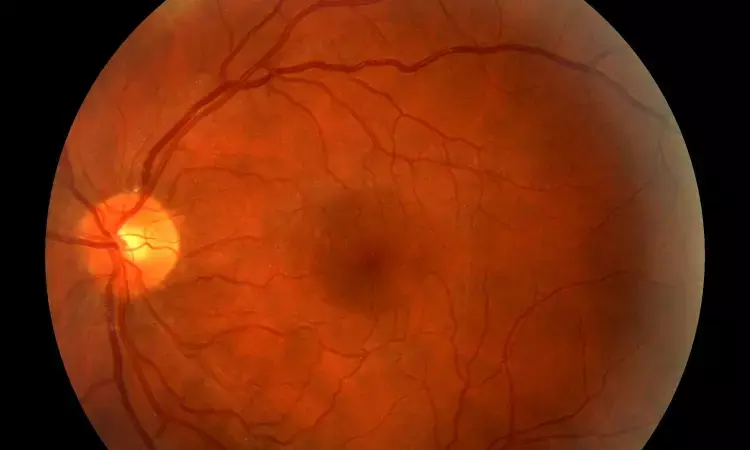- Home
- Medical news & Guidelines
- Anesthesiology
- Cardiology and CTVS
- Critical Care
- Dentistry
- Dermatology
- Diabetes and Endocrinology
- ENT
- Gastroenterology
- Medicine
- Nephrology
- Neurology
- Obstretics-Gynaecology
- Oncology
- Ophthalmology
- Orthopaedics
- Pediatrics-Neonatology
- Psychiatry
- Pulmonology
- Radiology
- Surgery
- Urology
- Laboratory Medicine
- Diet
- Nursing
- Paramedical
- Physiotherapy
- Health news
- Fact Check
- Bone Health Fact Check
- Brain Health Fact Check
- Cancer Related Fact Check
- Child Care Fact Check
- Dental and oral health fact check
- Diabetes and metabolic health fact check
- Diet and Nutrition Fact Check
- Eye and ENT Care Fact Check
- Fitness fact check
- Gut health fact check
- Heart health fact check
- Kidney health fact check
- Medical education fact check
- Men's health fact check
- Respiratory fact check
- Skin and hair care fact check
- Vaccine and Immunization fact check
- Women's health fact check
- AYUSH
- State News
- Andaman and Nicobar Islands
- Andhra Pradesh
- Arunachal Pradesh
- Assam
- Bihar
- Chandigarh
- Chattisgarh
- Dadra and Nagar Haveli
- Daman and Diu
- Delhi
- Goa
- Gujarat
- Haryana
- Himachal Pradesh
- Jammu & Kashmir
- Jharkhand
- Karnataka
- Kerala
- Ladakh
- Lakshadweep
- Madhya Pradesh
- Maharashtra
- Manipur
- Meghalaya
- Mizoram
- Nagaland
- Odisha
- Puducherry
- Punjab
- Rajasthan
- Sikkim
- Tamil Nadu
- Telangana
- Tripura
- Uttar Pradesh
- Uttrakhand
- West Bengal
- Medical Education
- Industry
Finerenone prevents progression of non-proliferative diabetic retinopathy: Study

Denmark: A recent study in Diabetes, Obesity and Metabolism has reported the potential benefit of finerenone for delaying the progression of non-proliferative diabetic retinopathy (NPDR) and preventing ocular interventions.
The researchers stated that although the analysis was exploratory and hypothesis-generating, further studies may be required to draw conclusions based on these findings. These findings suggest considering randomized studies with adequate power for detecting a potential benefit of finerenone in delaying the progression of NPDR, especially given the lack of alternatives for oral DR treatment.
Diabetic retinopathy and chronic kidney disease are two primary forms of microvascular complications in type 1 diabetes and type 2 diabetes patients, with shared clinical factors being smoking, poor glycemic control, hypertension, smoking, dyslipidemia and clinical manifestations.
The steroid hormone aldosterone binds to the mineralocorticoid receptors promoting vascular pathology in the retina relevant to the development of diabetic retinopathy (DR). Therefore the progression of DR may be delayed by the antagonism of the retinal mineralocorticoid receptor–aldosterone system. Finerenone is an orally administered nonsteroidal mineralocorticoid receptor antagonist (MRA) that has been shown to slow the chronic kidney disease (CKD) progression and reduce the risk of cardiovascular outcomes compared to placebo in patients with CKD and T2D in FIDELIO-DKD (n = 5674) and FIGARO-DKD (n=7352) randomized phase 3 trials. No further details were collected in these studies on DR.
In two identical hypothesis-generating studies, ReFineDR and DeFineDR, data from participants who had routine ophthalmological assessments during the study period were utilized to explore the effect of finerenone on DR progression. Peter Rossing, Steno Diabetes Center Copenhagen, Herlev, Denmark, and colleagues reported a pooled analysis of combined ReFineDR and DeFineDR studies.
The researchers retrospectively obtained ophthalmological data from routine examinations of patients with a medical history of DR who were participants of either trial at selected study centres. Eligible patients were 18 years or older with type 2 diabetes and chronic kidney disease and treated with RAS.
Eligible patients were routinely examined between 6 months prior and one-month post-randomization showing treatment-naive NPDR in at least one eye and at least one successive routine ophthalmological examination.
The primary outcome of the ReFineDR/DeFineDR analysis was the progression of NPDR defined by the occurrence of vision-threatening complications (VTC) -- a composite endpoint of diabetic macular oedema (DME), anterior segment neovascularization, or progression to proliferative DR in at least one eye up to 2 years following the treatment initiation.
A total of 244 patients from 376 eligible patients were included in the analysis. One hundred thirty-four received at least one finerenone dose, and 110 received a placebo.
The study led to the following findings:
· 68.7% and 71.8% of patients in the finerenone and placebo groups had mild/moderate NPDR at baseline.
· More data show 3.0% and 10.0% had severe NPDR, respectively. The mean baseline HbA1c was comparable between each group (finerenone: 66.7 mmol/mol [8.25%]; placebo: 65.9 mmol/mol [8.18%]).
· At the two-year mark, 3.7% and 6.4% of patients in the finerenone and placebo groups had experienced vision-threatening complications in at least one eye.
· The number of vision-threatening complications was shown to increase beyond two years, with Kaplan-Meier-estimated cumulative incidence probabilities favouring finerenone increasing at 30 months (difference, –0.109) and 36 months (difference, -0.118).
Reference:
Doi: 10.1111/dom.14915
Dr Kamal Kant Kohli-MBBS, DTCD- a chest specialist with more than 30 years of practice and a flair for writing clinical articles, Dr Kamal Kant Kohli joined Medical Dialogues as a Chief Editor of Medical News. Besides writing articles, as an editor, he proofreads and verifies all the medical content published on Medical Dialogues including those coming from journals, studies,medical conferences,guidelines etc. Email: drkohli@medicaldialogues.in. Contact no. 011-43720751


